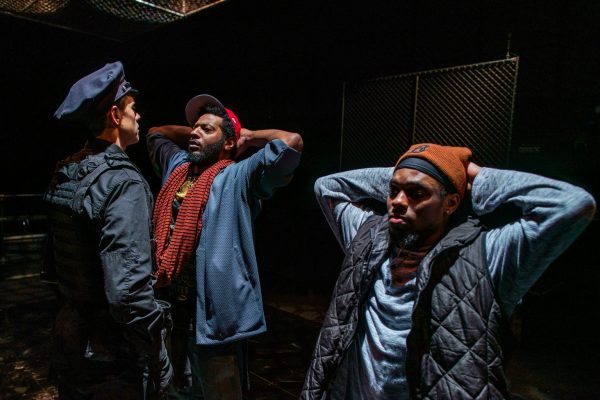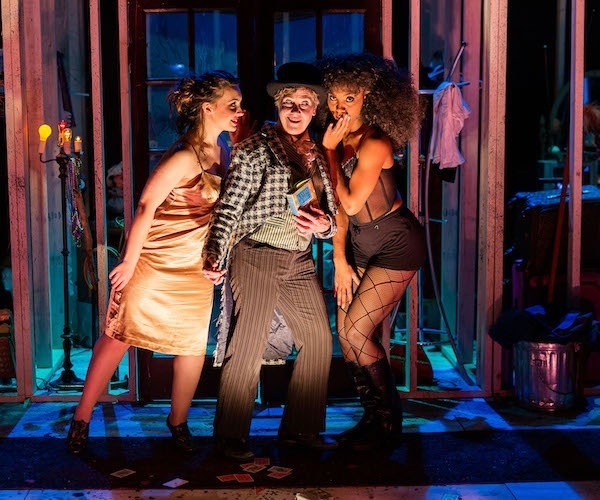Arts Feature: Best Stage Productions of 2020
Compiled by Bill Marx
Our theater critics pick some of the outstanding productions of a year truncated by COVID-19.
Robert Israel
The insidious COVID-19 pandemic this year has claimed way too many lives, ruined legions of livelihoods, and darkened once brightly lit auditoriums. Theater companies large and small have canceled entire seasons, as would-be audiences have hunkered down, following state restrictions and settling into social isolation.
It could be argued that the pandemic didn’t entirely kill live stage productions: a smattering of shows have been produced at outdoor venues and several found their way to small screens via prerecorded or live video (Zoom) feeds. But the overall effects on theater have been devastating.
Once of the first losses claimed by the pandemic was playwright Terrence McNally, who died at age 81 from complications of the coronavirus in a Florida hospital in March. A prolific and versatile dramatist, at his best he penned scripts for stage and screen that forced audiences to move outside of their comfortable assumptions. As a result, over the course of his career McNally endured death threats and cancellations, yet he stubbornly held onto the belief that the function of art is to help us “to live fully, to live it with people, to engage in the world around you.”

Lewis D. Wheeler, Kadahj Bennett, and Hubens “Bobby” Cius in the SpeakEasy Stage production of Pass Over. Photo: Nile Scott Studios.
Playwright Antoinette Nwandu succeeded in accomplishing McNally’s goal in her one act play Pass Over, staged by SpeakEasy Stage Company (in collaboration with the Front Porch Arts Collective) in Boston back in January. Time – the past, the present, and the future – swirled about in a maelstrom that sucked the audience into an unsettling comedic drama. (Director Spike Lee’s film version of the script is available online via Amazon Studios). A year has passed since I attended this live production, but I can still feel the effects of Nwandu’s landscape of devastation. She probed the festering wounds of systemic racism that continue to spread toxicity through a fractured nation.
If Mart Crowley’s 1968 play (one film version came out in 2020) The Boys in the Band (Netflix) is any indication, those wounds will probably never heal. Originally produced off-Broadway, the play exposed the endangered lives of a group of gay male friends who gather at a birthday party that is anything but celebratory. The script duplicates the intensity found in the scathing dialogue of Edward Albee’s Who’s Afraid of Virginia Woolf? Crowley died of complications from heart surgery at age 84 this year, shortly after completing work on this film. In this version, his characters have much to teach all about our common humanity, but there are no easy answers to division. There is no way forward other than to look at one another and ourselves with honesty.

Penny Arcade in a scene from Longing Lasts Longer. Photo: courtesy of the artist.
I found a similar bold demand for truth in performer Penny Arcade’s rambling monologue at this year’s (scaled-down) Provincetown Tennessee Williams Theater Festival. She held forth in Seeking Asylum, wherein she revealed herself to be a survivor of the excesses of the ’60s and ’70s. Via a traumatic variation on Mae West’s famous line, “I used to be Snow White, but I drifted,” Arcade confessed to outdoor audience at Ptown’s Bas Relief Park that she had been the victim of multiple rapes in New York City, that she had struggled through substance abuse, and had found, in theater, a lifeline to sanity. She is a survivor who shares her wounds with humor and warmth — as well as brutal frankness.
Finally, while this difficult year comes to a close, I would ask readers and audience to consider this quote from Joseph Haj, artistic director of the Guthrie Theater in Minneapolis
“I would argue that theater is not some old-fashioned practice that has survived accidentally,” Haj insists, “perhaps it has thrived because it is one of society’s proven necessities.”
David Greenham
2020 was a short year when it came to reviews. Between mid-January and mid-March I managed to see just four productions. Nine months and counting have passed without my attending a live performance. It’s probably the first time since I was a young child that I’ve gone that long without attending a production some kind. The time off has only increased my belief in the power of live performance, its elemental enchantment.
With all due respect to the many interesting – and some wonderful – online performances that have been presented since the pandemic began, they don’t match the extra joy of being part of an audience that has gathered in the same place at the same time to experience a theatrical event.

Josephine Moshiri Elwood, Debra Wise, and Malikah McHerrin-Cobb in the URT production of Vanity Fair. Photo: Nile Scott Studios.
The production that sticks out for me the most was Kate Hamill’s marvelous adaptation of the novel Vanity Fair, produced by Underground Railway Theater last January and February under the title Vanity Fair: An (Im-)morality Play. Given its stellar performances and wonderful technical elements, I concluded in my Arts Fuse review: “In short, Underground Railway Theater has a runaway hit, and you’ll never see a show quite like it. It’s bold, ridiculous, and very risky”
Looking ahead, my sincere hope for whatever is in store in the world of post-COVID theater is that theater artists and audiences embrace the need for more innovation and risk-taking, that there will be wild celebrations of the creative spirit. This pandemic has shaken perceptions of the value of live performance to its very core. The trauma goes far beyond the fact that most of our favorite venues are no longer considered safe: the economy of the entire theater industry has all but collapsed. No doubt some stages, particularly the medium to the small, will never return. But I believe strongly in this art form; I have no doubt in the resilience of our creative workforce: theater is not dead. On the contrary, I am confident that, inspired by seemingly insurmountable odds, great collaborations and experiments are sure to emerge. Live theater, I miss you, and I can’t wait to see what’s next.
Bill Marx
A few of my favorites, in no particular order — most of them staged after the COVID-19 restrictions shut down live performances.

A glimpse of the ongoing protests last summer demanding the return of democracy in Belarus. Photo: Arlekin Players Theatre.
Insulted. Belarus(sia), presented by Arlekin Players Theatre and RogueMachine Theatre. With so many of our theaters doing so little to respond to hard times, this online reading was a refreshing reminder of the role of the stage at times of political turmoil. Andrei Kureichik wrote this play right after the debacle of the Belarus election. He is a member of the Coordination Council of Belarus — a group working to lead the transition to a new government and institute free elections. Many in the troupe are now in prison: Kureichik is in hiding. The dramatist’s earnest depiction of dissent’s endurance in the face of brutal tyranny was an affecting piece of witnessing. It was heartening to see it, and to hear from the courageous playwright during the post-reading discussion. It is not often a writer tells you what it is like fighting the good fight in medias res. Another Zoom production with political relevance worth commending, Artsakh: A Cry From the Mountains, an evening dedicated to Armenia presented by Arlekin Players Theatre, co-producer Sara Stackhouse of BroadBand Collaborative, and presenting partner Cherry Orchard Festival.
The Smoking Car and Self-Sacrifice, produced by the Metropolitan Virtual Playhouse. OK, these choices are personal to the point of literary fetish. But, as an admirer of editor and novelist William Dean Howells, I figured I would never see a staging of his plays, short scripts he popped out for quick cash. So, to my surprise and delight, New York’s Metropolitan Playhouse presented Zoom stagings of two of his pieces — and they turned out to be pleasurable piffles that humorously skewered social hypocrisies and delusions of romance. One conclusion I came to after viewing the pair: Henry James was the far, far superior novelist, but it is Howells who was the better dramatist — he was adept at the sit-com, turn-of-the-century version.

Katherine Hunter and cast in the RSC’s Timon of Athens. Photo: Gerry Goodstein.
Timon of Athens, a co-production with Shakespeare Theatre Company, in association with the Royal Shakespeare Company at the Polonsky Shakespeare Center in Brooklyn, NY. Is this not the perfect time for Shakespeare’s notoriously sloppy tragedy about a society destroyed by its unquenchable appetite for mammon? For me, the script is a fascinating, if lumpy and bumpy, black comedy with a nihilistic sting, a lacerating parable about how the worship of gold warps individuals and society. The production was fine — galvanized by a strong performance by Kathryn Hunter as Timon — though it faltered at the end. Here the death of Timon was given Christlike trappings. We are left with the suggestion that, because of what happened to her (and its vision of the extinction of kindness), the forces of rebellion and the status quo have been sobered up, to the point of pledging to arrive at a just peace. I was not convinced.
In early August, I experienced an afternoon of live theater. It was a heartening spectacle, an act of gratitude for community support as well as a moving, at times beautiful, gesture of artistic resilience. Double Edge Theatre’s 6 Feet Apart, All Together was staged in various picturesque spots throughout the company’s expansive farm acreage in Ashfield, MA. (All safety procedures were followed: masks, social distancing, breaking the audience members up into small groups.) It was an eclectic (to say the least) lineup selected from past Double Edge Theatre productions, including snippets from Homer’s Odyssey, Cervantes’s Don Quixote, and Leonora Carrington’s The Hearing Trumpet, among others. Escaping the claustrophobic perimeters of Zoom for the world of flesh and blood in a splendid natural setting was exhilarating.
Theater of War, “co-founded in 2009 by Bryan Doerries and Phyllis Kaufman, who served as producing director from 2009 to 2016. Doerries currently serves as the company’s artistic director. Since its founding in 2009, Theater of War Productions has facilitated events for more than 300,000 people, presenting over 20 tailored programs targeted to diverse communities across the globe.” This innovative (and powerful) project uses Zoom to “present dramatic readings by acclaimed actors of scenes from ancient Greek plays to help nurses, doctors, EMTs, first responders, administrators, and other heath care providers engage in healing, constructive discussions about the unique challenges and stressors of the COVID-19 pandemic.” This admirable theatrical/community-building endeavor is also branching out into readings from the Bible, such as selections from the Book of Job. I saw a presentation of patches from Sophocles’s Philoctetes and Women of Trachis and it was a memorable experience — highlighted by a powerful turn by Frances McDormand as a dying Hercules, writhing in pain and fury. Unlike us, the Greeks knew how important it is to dramatize rage. See my Arts Fuse commentary

I’m surprised you did not mention This is Who I Am by Amir Nizar Zuabi. It was live, but not in person (like Theater of War), and one of the best scripts in a very long time, terrific acting and direction, and was written for Zoom. It is a perfect fit, with none of the awkward constraints of zoom boxes, the effort to overcome them, to shoehorn a stage play into the rigid form. The script is about as close to the perfect way to explore lives lived in a political hot spot without a hint of dogma, agit-prop or political grand standing; the politics is neither foreground nor background – just the day to day nuances that seep into daily life and form and deform those lives; and the slow and measured reveals of character and events is another close to perfect balance the script achieves. It’s playing for 3 more days – TUNE IN! (through ART or Wooly Mammoth)
Sounds like a great suggestion. I have not had a chance to see it. I had a critic who wanted to review it. Waiting for his piece. I will nudge him.